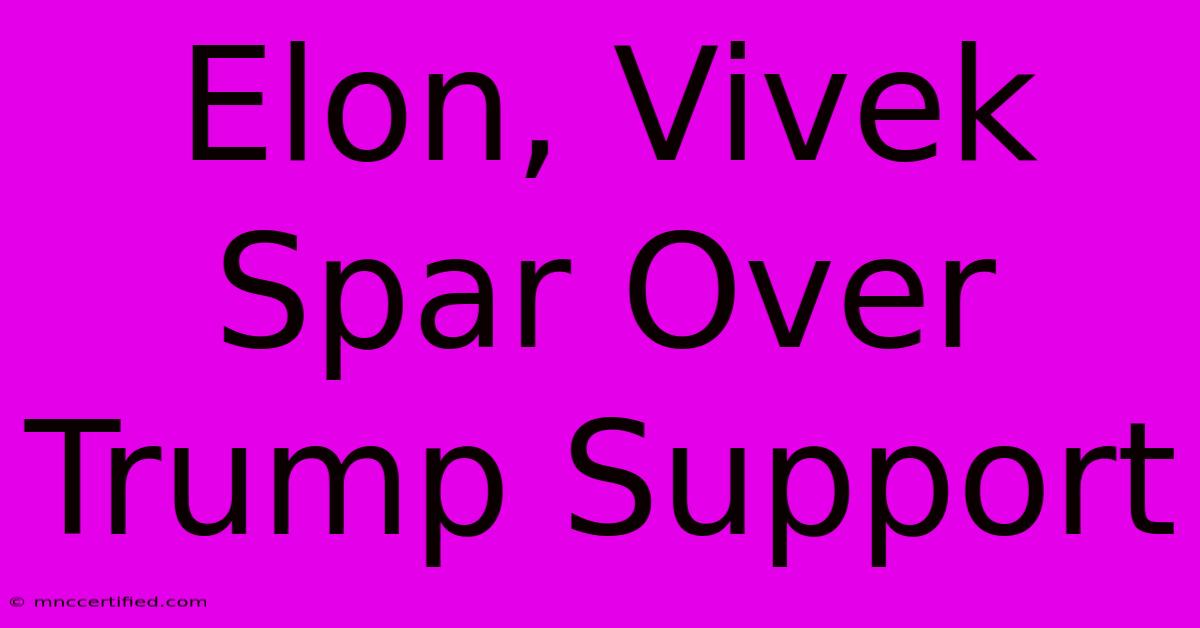Elon, Vivek Spar Over Trump Support

Table of Contents
Elon Musk and Vivek Ramaswamy: A Spar Over Trump Support
The 2024 Presidential race is heating up, and a significant subplot involves the differing opinions of high-profile figures on Donald Trump's candidacy. Specifically, a recent public exchange between tech mogul Elon Musk and entrepreneur Vivek Ramaswamy highlights a crucial fissure within the Republican party and its evolving relationship with the former President. This article delves into the details of their disagreement, exploring the underlying political dynamics and potential consequences.
The Spark: Ramaswamy's Unwavering Support
Vivek Ramaswamy, a relatively new face in national politics, has positioned himself as a staunch supporter of Donald Trump. His unwavering loyalty, often expressed through enthusiastic endorsements and public appearances, has solidified his image as a key figure within the Trump wing of the Republican party. This unwavering support, however, has drawn criticism from various quarters, including from unexpected sources.
Ramaswamy's Strategy: A Calculated Risk?
Ramaswamy's ardent support for Trump could be viewed as a strategic move to garner the support of Trump's considerable base. By aligning himself closely with the former President, he aims to tap into a powerful voting bloc and enhance his own political prospects. However, this strategy is not without risk. The ongoing legal battles and controversies surrounding Trump could potentially taint Ramaswamy by association, potentially hindering his future ambitions.
Elon Musk's Measured Critique
In contrast to Ramaswamy's enthusiastic support, Elon Musk has expressed a more measured, and at times critical, stance towards Trump. While not outrightly rejecting Trump, Musk has voiced concerns about certain aspects of Trump's political positions and actions. This nuanced approach differs sharply from Ramaswamy's unwavering loyalty, setting the stage for their public disagreement.
Musk's Pragmatism: A Different Approach
Musk's approach appears driven by a pragmatic assessment of the political landscape. His criticism isn't necessarily partisan; rather, it reflects a focus on policies and outcomes, seemingly prioritizing what he perceives as best for the country irrespective of party lines. This pragmatism sets him apart from the more ideologically driven approaches of other prominent figures in the political sphere.
The Public Sparring: A Clash of Ideologies
The differing viewpoints between Musk and Ramaswamy have occasionally spilled into the public domain, generating considerable online discussion and media coverage. While not always directly confrontational, their contrasting stances highlight the internal struggles within the Republican party, particularly regarding its future direction and relationship with Trump's legacy.
The Stakes: Beyond Personal Opinions
The Musk-Ramaswamy exchange represents more than just a personal disagreement; it reflects a broader ideological battle within the Republican party. It highlights the tension between unwavering loyalty to Trump and a more pragmatic, potentially less partisan, approach to governance. The outcome of this internal struggle will likely have significant implications for the future direction of the party and the 2024 Presidential election.
Conclusion: A Shifting Political Landscape
The public exchange between Elon Musk and Vivek Ramaswamy regarding Donald Trump's candidacy provides a valuable insight into the evolving dynamics of American politics. It demonstrates the complexities of navigating allegiances and ideologies within a highly polarized political climate. As the 2024 election draws closer, these internal disagreements within the Republican party will continue to play a crucial role in shaping the political landscape and ultimately, the outcome of the election. The future will tell whether Ramaswamy's unwavering loyalty or Musk's more pragmatic approach will ultimately prevail.
Keywords: Elon Musk, Vivek Ramaswamy, Donald Trump, 2024 Election, Republican Party, Political Debate, Trump Support, Political Strategy, US Politics, Election Analysis
On-Page SEO: The article uses header tags (H2, H3) to structure the content logically, making it easy for search engines to understand the topic hierarchy. Keyword density is managed naturally, avoiding keyword stuffing. Readability is enhanced through clear and concise writing, along with the use of bullet points and bold text.
Off-Page SEO: Promoting this article would involve sharing it on social media platforms, engaging with relevant online communities, and potentially reaching out to relevant news outlets or bloggers. Building high-quality backlinks from reputable websites would further boost the article's ranking in search engine results.

Thank you for visiting our website wich cover about Elon, Vivek Spar Over Trump Support. We hope the information provided has been useful to you. Feel free to contact us if you have any questions or need further assistance. See you next time and dont miss to bookmark.
Featured Posts
-
Vanderbilt Vs Georgia Tech 2024 Birmingham Prediction
Dec 28, 2024
-
Vanderbilt Vs Georgia Tech 2024 Birmingham Game
Dec 28, 2024
-
Avian Flu Nationwide Pet Food Recall
Dec 28, 2024
-
Texas Tech Arkansas Football Live Stream Info
Dec 28, 2024
-
Gleyber Torres Signs 15 M Deal
Dec 28, 2024